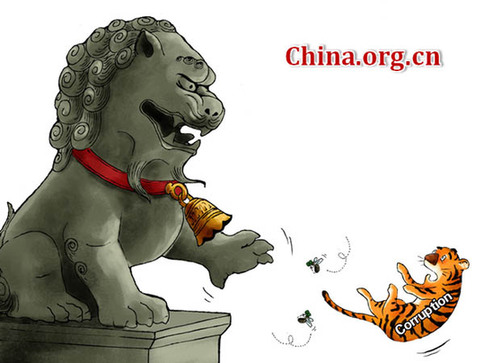Hunting monster-sized 'flies'
- By Ji Naili
 0 Comment(s)
0 Comment(s) Print
Print E-mail China Daily, November 15, 2014
E-mail China Daily, November 15, 2014
Currency notes worth 120 million yuan ($19.6 million), 37 kilograms of gold and documents on the ownership of 68 houses. These were found by investigators in the house of Ma Chaoqun, manager of a State-owned water company branch in Qinhuangdao, Hebei province of North China.
|
|
|
Shock 'tigers' and awe 'flies' [By Zhai Haijun/China.org.cn] |
Ma is not a "tiger", or high-ranking corrupt official. But he is not a mere "fly", or lower-level corrupt official either.
He can be described as a monster-sized fly, though. Such monster-sized "flies" are scattered across the country, and have given lie to the popular belief that the higher position a corrupt official holds, the more illegal wealth he/she amasses.
The level of corruption depends on the amount of resources an official controls, not by the rank he holds. Generally, higher-ranking officials control more resources. But in some cases some bottom-level officials, too, control considerable amounts of resources.
Ma was in charge of water supply in the Beidaihe zone of coastal city Qinhuangdao, which has a number of hotels and villas where senior officials spend their summer vacation. Being the manager of a branch of a State-owned enterprise that has monopoly over the supply of drinking water in the area, he exercised immense power within the SOE, say insiders.
In similar cases reported by disciplinary agencies across the mainland, the giant "flies" have ranged from village officials to police officers. It may be hard to believe, but even a traffic police chief of a town could earn 10 million yuan by issuing fake driving licenses and through other illegal deals.
There are three types of monster-sized "flies". The first are those exercising monopoly control over certain kinds of resources. Although China follows market economy, the State still controls some resources considered essential to the national economy. And since they are distributed through authorized agencies, officials who control their supply can easily trade power for money. Ma fits into this type, so do tobacco officials who fill their bureaus with relatives.






